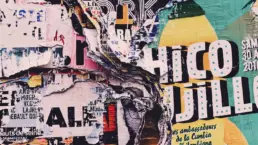The field of Typography employs a number of technical terms when describing letterforms.

If you take the time to learn these, you will find it much easier to identify specific faces, and will quite possibly amaze all your friends with your knowledge of type.*

Throughout this post, the examples sit on a collection of lines.
- Ascender Height
- Cap Height is the extent of a capital letter.
- The Median is the line defining the X-height of the letterforms.
- Baseline refers to the line that all characters ‘sit’ on.
- Descender Depth.
Stroke

Any line that defines the letterform.
Apex and Vertex

The point created at the junction of two diagonal stems.
Arm

Short strokes off the stem of the letterform, either horizontal (E, F, T) or inclined (K, Y)
Ascender

The portion of the stem of a lower case character that rises above the median.
Barb

The half-serif finish on some curved letterforms.
Beak

The half-serif finish on some horizontal arms.
Bowl

The rounded form that describes a counter. The bowl may be either open or closed.
Bracket

The transition between the serif and the stem.
Counter

The negative space within a letterform, either fully or partially enclosed.
Cross Bar

The horizontal stroke that joins two stems together.
Cross Stroke

The horizontal stroke in a letterform that intersects the stem.
Crotch

The interior space where two strokes meet.
Descender

The portion of the stem of a lowercase letterform that projects below the baseline.
Ear

The stroke that extends out from the main stem or body of the letterform.
Finial

The rounded non-serif terminal to a stroke.
Leg

Short stroke off the stem of the letterform, either at the bottom of the stroke (L) or inclined downward (K, R)
Ligature

The character formed by the combination of two or more letterforms. Opentype fonts allow flexible access to ligatures.
Link

The stroke that connects the bowl and the loop of a lowercase G.
Loop

In some typefaces, the bowl created in the descender of the lowercase G.
Shoulder

The curved stroke that is not part of a bowl.
Spine

The curved stem of the S.
Spur

The extension that articulates the junction of a curved and vertical stroke.
Stem

The significant vertical or oblique stroke.
Tail

The curved or diagonal stroke at the finish of certain letterforms.
Further Reading
This post was created with heavy reference to A Type Primer by John Kane (Laurence King Publishing / ISBN 1-85669-291-4). If you’re interested in typography and grids, I can’t recommend it enough.
*NStudio can accept no responsibility for any loss of friendship resulting from discussion of this blog content.
—
Header Image: Raphael Schaller on Unsplash.











